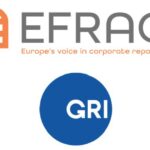
The IFRS Foundation and EFRAG have published guidance material to illustrate the high level of alignment achieved between the International Sustainability Standards Board’s IFRS Sustainability Disclosure Standards and the European Sustainability Reporting Standards (ESRS) and how a company can apply both sets of standards, including detailed analysis of the alignment in climate-related disclosures. Having first worked during the development of the ISSB Standards and ESRS to deliver a high degree of alignment, today’s publication now provides practical support that explains how companies can efficiently comply with both sets of standards.
The document has been designed to reduce complexity, fragmentation and duplication for companies applying both the ISSB Standards and ESRS. As companies around the world are increasingly mandated to disclose sustainability-related information through the ISSB Standards and ESRS, EFRAG and the ISSB are committed to creating efficiencies where possible to advance transparency, comparability and accountability. Companies utilising this guidance will be better able to collect, govern and control decision-useful data once.
The guidance:
• describes the alignment of general requirements including on key concepts such as materiality, presentation and disclosures for sustainability topics other than climate; and
• provides information about the alignment of climate disclosures and what a company starting with either set of standards needs to know to enable compliance with both sets of standards.
Mairead McGuinness, Commissioner for Financial Services, Financial Stability and Capital Markets Union, said: “Climate change is a global challenge. I welcome today’s guidance that recognises the Commission’s sensible approach to sustainability reporting, and a commitment to ensuring a very high degree of alignment between EU and international sustainability reporting standards. It is important that reporting frameworks in different jurisdictions are interoperable with each other to reduce the reporting burden for EU companies.”
Patrick de Cambourg, Chair, EFRAG Sustainability Reporting Board, said: “On the basis of our joint efforts, we are very happy to be able to issue this very practical guidance on interoperability illustrating in particular how ESRS embed the global baseline approach developed by the ISSB. It demonstrates EFRAG’s commitment to the much needed international convergence of sustainability-related disclosures, on climate and other critical sustainability matters, and our full support to the global momentum in this crucial space.”
Chiara Del Prete, Chair, EFRAG Sustainability Reporting Technical Expert Group said: “The release of this guidance is a milestone for progressing interoperability and quality of sustainability-related data. ESRS preparers are able to report on climate, also in compliance with
ISSB Standards, only with a very limited number of points to consider, clearly identified in Section 3 of this document. This document also explains that ESRS preparers are able to utilize ESRS to comply with ISSB Standards to report on matters beyond climate. This guidance reflects our commitment to avoid duplicative reporting and support preparers and other stakeholders in their implementation challenges. Now, our next step is digital interoperability.”
Emmanuel Faber, Chair, ISSB said: “The ISSB’s goal is to inform investor capital allocation decisions by ensuring they have access to globally comparable, targeted and decision-useful disclosures. Thanks to our deep collaboration with EFRAG, companies can use our joint guidance as a module for providing the global baseline while also providing incremental disclosures required within the European Union.”
Sue Lloyd, Vice-Chair, ISSB said: “We recognise the call to deliver efficiencies for companies that will be required – or choose – to apply both ISSB Standards and ESRS. As jurisdictions around the world move to adopt or otherwise use ISSB Standards, we expect this interoperability guidance will provide practical help to companies needing to understand how to apply the respective requirements of both ISSB Standards and ESRS.”
Download the guidance material.



